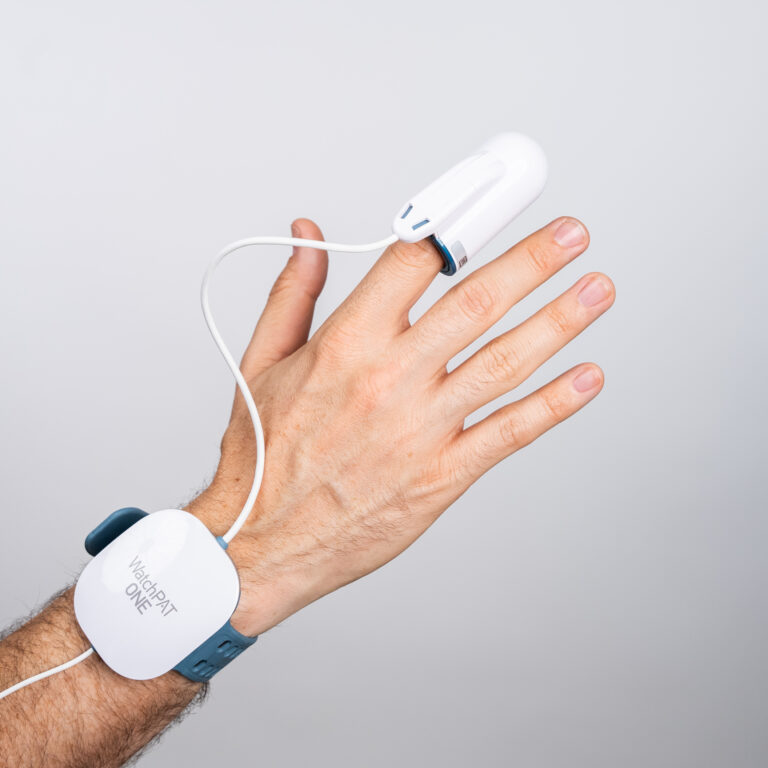When you buy through our links, we may earn a commission. Products or services may be offered by an affiliated entity. Learn more.
How to Talk to Your Doctor about Your Sleep
Everyone deserves a good night’s sleep. If you’re having trouble sleeping, you may want to talk to your doctor about it.
Poor sleep, whether occasional or frequent, can lower your quality of life. You may find yourself having trouble concentrating at work or school, staying focused while driving, or getting more irritable than usual. Left untreated, sleep disorders can lead to more problems and serious health issues. Unfortunately, many individuals wait longer than needed to seek out treatment.
The good news is many sleep disorders can be resolved or mediated with the correct diagnosis and treatment. It’s just up to you to seek out help and talk to your doctor.
Our Recommended At-Home Sleep Apnea Test

our partner at sleepdoctor.com
45% off a Home Sleep Test
Shop Now“Truly grateful for this home sleep test. Fair pricing and improved my sleep!”
Dawn G. – Verified Tester
When Should You Talk To Your Doctor About Your Sleep?
How do you know when it’s time to talk to your doctor about your sleep? Look out for these telltale signs.
- You regularly have trouble falling or staying asleep
- You often wake up earlier than you’d like to
- You don’t feel refreshed upon waking up
- You feel excessively sleepy or tired during the day, even if you slept for 7 hours the night before
- You feel the need to take naps during the day to feel adequately rested
- You have difficulty performing daily activities due to your sleep problems
- You fall asleep while driving, watching television, or reading
- You have had a sleep partner tell you that you snore or gasp loudly during the evening
- Your sleep partner has told you that you seem to sleepwalk, act out your dreams, or otherwise make abnormal movements during the night
If you’ve experienced any of the above more than one night a week for multiple weeks in a row, it’s time to talk to a doctor about your sleep.
How To Prepare for Your Appointment
You can make your doctor’s appointment more successful and beneficial by coming prepared. Keep a sleep diary in the weeks leading to your appointment. Record when you went to sleep and when you woke up, how long you slept overall, how frequently you awoke during the night, how long it took you to fall back asleep, and any other symptoms you experienced. It can also be helpful to note what you ate or drank each day and when you exercised.
A sleep diary can be an important tool in helping your doctor get to the root of your problem, as it helps you provide your doctor with a more accurate assessment of your sleep issues. When people are asked questions about their insomnia, they’re more likely to exaggerate their symptoms. Having a sleep diary to refer to may provide more objective sleep data.
In addition to your sleep diary, tell your doctor what strategies, if any, you’ve tried to relieve your sleep issues and what effect they’ve had. Write down any medications you are currently taking for any health conditions.
Finally, make a list of the questions you want to ask your doctor about your sleep.
What Will Your Doctor Ask You About?
Your doctor will have their own questions to ask to help them diagnose what’s causing your sleep issues. These questions may include:
- What sleep issues have you been experiencing, and for how long?
- When did you first notice your symptoms? Did anything else in your life change at that time?
- Before you started having trouble with your sleep, what did a good night’s sleep feel like for you?
- How do your sleep issues affect you during the day?
- How long does it take you to fall asleep after going to bed? What time do you fall asleep and when do you wake up?
- Do you ever wake up early and can’t fall back asleep?
- Are you pregnant or experiencing menopause?
- Do you smoke, or drink coffee or alcohol? How much do you drink or smoke on an average day?
- What type of exercise do you engage in, and at what times of the day?
- How is your mental health? Do you feel stressed, anxious, or depressed?
Some sleep issues are symptomatic of insomnia, a sleep disorder affecting up to one-third of self-reporting adults that describes a chronic difficulty with falling or staying asleep. Other sleep issues can point to other sleep disorders, like sleep apnea, restless legs syndrome, narcolepsy, or parasomnias like sleepwalking or REM sleep behavior disorder.
It’s also possible an underlying medical condition is causing, or at least contributing to, your sleep issues. Some of the health conditions associated with poorer-quality sleep include chronic pain, cancer, acid reflux, diabetes, depression, or hormonal changes due to pregnancy or menopause. In addition to asking you questions, your doctor will likely perform a physical examination to determine if one of these conditions is affecting your sleep.
What Can You Expect After Speaking to Your Doctor About Sleep Problems?
Based on your history and exam, your doctor will determine the appropriate next steps. While some patients expect to receive medication upon initially seeking professional help for their sleep issues, doctors often recommend alternative treatments first, such as sleep hygiene, therapy, or refer you to a specialist. As you begin treatment, your doctor will likely ask you to continue keeping your sleep diary so they can see whether the treatment is working, and adjust things as needed.
Better sleep hygiene is commonly the first step in treatment. Your doctor may recommend following a consistent sleep schedule every day, changing your diet or exercise regimen, developing a calming bedtime routine, or making adjustments to your bedroom environment to make it more conducive to sleep.
Cognitive-behavioral therapy for insomnia, or CBT-I, may also be recommended. CBT-I focuses on helping you recognize the thoughts and behaviors that disturb your sleep (such as nighttime stress or worry, or drinking too much caffeine) and replacing them with behaviors that enable healthy sleep.
If your doctor suspects a sleep disorder is causing your sleep issues, they may refer you to a sleep specialist. Sleep specialists have specialized training in sleep medicine, and they will ask you more questions about your symptoms before providing a specific diagnosis or treatment recommendation. Often, they will perform an overnight sleep study (known as a polysomnogram) where they monitor your sleep along with other vitals like your brainwaves, breathing, and eye and limb movements. It’s common for people with insomnia to underestimate how much sleep they are actually getting, and a polysomnogram can help rule out other conditions like sleep apnea.
Some sleep disorders are actually a symptom of an underlying issue, which, once treated, relieves the sleep problem. Your doctor may focus first on treating that issue. For example, they may prescribe antidepressants if they determine anxiety or depression is contributing to your sleep issues.
Many sleep problems can be alleviated or resolved with proper diagnosis and treatment. Talk to your doctor if you’re concerned about your sleep. They may recommend certain lifestyle changes and sleep hygiene tips to improve your sleep. More serious conditions may be treated with a combination of sleep hygiene, therapy, and medications.

Still have questions? Ask our community!
Join our Sleep Care Community — a trusted hub of sleep health professionals, product specialists, and people just like you. Whether you need expert sleep advice for your insomnia or you’re searching for the perfect mattress, we’ve got you covered. Get personalized guidance from the experts who know sleep best.
References
8 Sources
-
National Heart Lung and Blood Institute. (2020, March 2). Insomnia., Retrieved December 29, 2020, from
https://www.nhlbi.nih.gov/health-topics/insomnia -
Mallinson, D. C., Kamenetsky, M. E., Hagen, E. W., & Peppard, P. E. (2019). Subjective sleep measurement: comparing sleep diary to questionnaire. Nature and science of sleep, 11, 197–206.
https://pubmed.ncbi.nlm.nih.gov/31686932/ -
Morin, C. M., LeBlanc, M., Daley, M., Gregoire, J. P., & Mérette, C. (2006). Epidemiology of insomnia: prevalence, self-help treatments, consultations, and determinants of help-seeking behaviors. Sleep medicine, 7(2), 123–130.
https://linkinghub.elsevier.com/retrieve/pii/S1389945705001954 -
National Center for Chronic Disease Prevention and Health Promotion, Division of Population Health. (2018, August 8). CDC – Sleep and Chronic Disease – Sleep and Sleep Disorders. Centers for Disease Control and Prevention.
https://www.cdc.gov/pcd/issues/2023/23_0197.htm -
Parish J. M. (2009). Sleep-related problems in common medical conditions. Chest, 135(2), 563–572.
https://linkinghub.elsevier.com/retrieve/pii/S0012369209601525 -
Saddichha S. (2010). Diagnosis and treatment of chronic insomnia. Annals of Indian Academy of Neurology, 13(2), 94–102.
https://pubmed.ncbi.nlm.nih.gov/20814491/ -
A.D.A.M. Medical Encyclopedia. (2020, January 29). Polysomnography. MedlinePlus.
https://medlineplus.gov/ency/article/003932.htm -
American Academy of Sleep Medicine. (2014). The International Classification of Sleep Disorders – Third Edition (ICSD-3). Darien, IL.
https://aasm.org/



